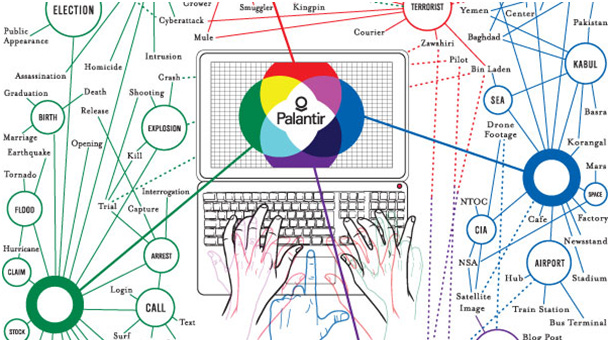
Imagine a company that knows everything about everyone. A company that is equally at ease helping banks identify fraud as it is helping intelligence agencies track down enemies of the state. A company that can combine pictures of you with cell phone location data, emails you've written, health records, credit card purchases and thousands of other pieces of electronic data to paint an intimate portrait of your life that any would-be investigator can pull up with a few keystrokes. A company that can target you anywhere in the world at any time.
Now stop imagining that company, because it already exists. It's called Palantir Technologies.
Founded by billionaire PayPal co-founder and Facebook early investor Peter Thiel, this plucky little Silicon Valley startup has long been the darling of the military and the intelligence community, and it's increasingly the darling of the corporate world. And—given Palantir's ability to surveil, track and, ultimately, control every aspect of your daily life—it isn't hard to see why.
Even so, few in the general public have ever heard of Palantir, and those who have know little beyond the fact that it's a bad company that does creepy things.
But this is The Corbett Report. We can do better than that.
Today, let's explore the roots of this threat to humanity, expose the extent to which it has already laid your life bare to the all-seeing eye of the would-be world controllers, and peer into the magical seeing stone to see what the future holds for Palantir Technologies.
WHAT IS PALANTIR?

So, what is Palantir, exactly?
As it turns out, that question is surprisingly easy to answer. Palantir is a front company for a once-secret military and intelligence program to collect and data mine every available piece of information about you. The hard part is extracting that simple answer from the mass of lies, obfuscation, untruths, half truths and contextless facts that are presented in the lamestream media's coverage of the company.
You see, the official story of this Silicon Valley surveillance specialist outfit—regurgitated in any number of mainstream puff pieces—is that Peter Thiel founded Palantir Technologies in 2004 as a vehicle for turning PayPal's fraud detection software into a marketable product. The dream was to assist the growing national security leviathan in creating a system for analyzing financial activity for signs of terrorist activity.
But, according to the "libertarian" Thiel (who works with and profits from the national security state, promotes warmongering politicians, writes paeans to Leo Strauss and Carl Schmitt, and, oh by the way, just happens to be a member of Bilderberg's steering committee), Palantir's software is not about constructing the most intrusive system of electronic surveillance ever devised. No, of course not! It's all about protecting civil liberties!
From its inception, Palantir was conceived as "a mission-oriented company," Thiel told Forbes in a 2013 profile of the company and its founders. "I defined the problem as needing to reduce terrorism while preserving civil liberties."
This is such a bald-faced and easily debunkable lie that it could only be regurgitated by the mockingbird repeaters of the dinosaur media. But it's easy to see why the dutiful stenographers of the lapdog press would repeat it. When it comes to Palantir, there are always more interesting things to report on than how it came to be founded or what it actually does.
Just take the name of the company: Palantir. It is a reference to the magical seeing stones that the wizards of J. R. R. Tolkein's mythical The Lord of the Rings universe use to see through space and time. This whimsical naming convention carries over into what one reporter has labeled a "casual, nerdy culture" that permeates the company:
-
Its offices are named after locations in the Tolkein fable. Thus, Palantir's Palo Alto headquarters is The Shire, its office in McLean, Virginia (located just six miles from the CIA) is Rivendell; its Washington, D.C., branch is dubbed Minas Tirith, etc.
-
It has a hotline called the Batphone that allows engineers to anonymously report to company officials any customer requests that they consider to be unethical.
-
Two of its core analytic software programs, Gotham and Metropolis, are named after cities in the DC Comics universe.
-
One of the conference rooms in The Shire has been converted into a ball pit.
Oh, how delightfully quirky! Surely no Silicon Valley startup with such an eclectic working environment could be involved in anything evil, could they?
To be fair, a number of the company profiles in the corporate press-a 2012 corporate profile from The Washingtonian, for example, or a 2013 profile of the company's eclectic philosophy grad CEO in Forbes, or a 2020 New York Times Magazine piece on "Does Palantir See Too Much?"-do gesture to the creepier facets of Palantir.
Why does Palantir's CEO, Alex Karp, insist on two-way mirrors for his office windows? Why does the company use acoustic transducers to vibrate the glass of their office windows, creating white noise to disrupt possible electronic eavesdroppers? Was Palantir's Prism program related to the NSA's PRISM program? (SPOILER: It sure wasn't! Nothing to see here, folks!)
But still, one is left wanting after reading these MSM articles. It's as if they have the pieces of a puzzle sitting in front of them but they still haven't actually put those pieces together.
In order to complete that puzzle, you need to turn to an independent reseracher like Whitney Webb. As Webb points out in her new, must-read, two-volume tour de force, One Nation Under Blackmail, Palantir was not founded in 2004—as the corporate presstitutes continually assert—but in May 2003. (The professional journos probably missed this small detail because they'd have to actually read through SEC filings to discover that Thiel's origin story of Palantir is a demonstrable lie, and what dinosaur media "reporter" has time to do that?)
Now, whether the company was founded in 2003 or 2004 may seem like a small detail at first glance, but, upon closer inspection, this data discrepancy—and the fact that Thiel has so often lied about the true founding of the company—provides a clue to Palantir's actual origin.
You see, it just so happens that May 2003 was the exact time when the Pentagon's Defense Advanced Research Projects Agency (DARPA) began officially backing away from its proposed Total Information Awareness (TIA) program, renaming it the Terrorism Information Awareness before Congress defunded the program altogether.
Never heard of the Total Information Awareness program? Well you probably remember the friendly little logo of the the Information Awareness Office (IAO), the DARPA department under which it operated:

Lest that image leave any doubt, the IAO and its TIA program were indeed committed to collecting, storing and analyzing every piece of data on as many people as possible—from personal e-mails to social networks, credit card records, phone calls, medical records and numerous other sources—without so much as a warrant. The program's goal was to "develop data-mining or knowledge discovery tools that would sort through the massive amounts of information to find patterns and associations," and it even included funding for "the development of biometric technology to enable the identification and tracking of individuals."
It's a testament to just how incredibly creepy and over-the-line the TIA program was that, even then, in 2003—at the absolute pinnacle of War of Terror hysteria—it was immediately denounced by almost everyone in the public as the most draconian system of surveillance ever proposed. This bipartisan, widespread public backlash led to the second downfall of the IAO's director, John Poindexter (who had previously been convicted for his role in the Iran-Contra affair), and to the defunding of the TIA program.
Thus, once we discover that Palantir was in fact incorporated in May 2003, not in 2004 as nearly every account of the company falsely asserts, we encounter a remarkable "coincidence." We discover that at the exact same moment as the TIA was being dismantled (and transferred deeper into the bowels of Uncle Sam's bureaucracy), Peter Thiel just decided to create a company that could do exactly what the TIA had been attempting to achieve. That alone would make it the most remarkable coincidence in the world since Facebook was launched on the very same day that DARPA's LifeLog program was scrapped. But, amazingly, it gets even more coincidental.
Do you want to guess who it was that Thiel and co. turned to when they were looking to find their first customer for their new TIA-like company? You guessed it:
One day not long after Palantir was launched in 2004 [sic], Poindexter received a call from his friend Richard Perle, ex-chair of the Defense Policy Board, asking if he’d come to Perle’s house for a meeting with two entrepreneurs he knew from Palo Alto—Alex Karp, Palantir’s CEO, and his fellow cofounder Peter Thiel, a billionaire venture capitalist who’d helped start PayPal and was an early investor in Facebook.
That's right, Thiel and Alex Karp—an eccentric philosophy grad and fellow Stanford Law School alum who Thiel appointed Palantir's CEO despite having no corporate experience—just so happened to secure a meeting with the recently-ousted chief of the TIA program. And it just so happened that Poindexter was so impressed by the duo's presentation—they had "elegantly accomplished what the TIA had set out to do" as one popular account put it—that he referred them to In-Q-Tel, the CIA's venture capital arm.
The CIA ended up pumping the first $2 million of outside money into the company and, more importantly, helped the company get its foot in the door with many other government clients, from intelligence agencies and military departments to US Immigration and Customs Enforcement, the Centre for Disease Control and the IRS (among others).
And the rest, as they say, is history. . . .
. . . History written by the winners, that is. After all, "intrepid" lamestream "reporters" now have a ready-made narrative to regurgitate for their profiles of the company: these weird, scruffily-dressed Silicon Valley outsiders arrived on the CIA's doorstep like a band of invading barbarians to tear down the protocols of stuffy bureaucracy. Heck, they even sued the US Army over its procurement practices and ended up winning Army contracts!
Lost amid the gee-whizzery of this story are the niggly little details connecting Palantir to its TIA predecessor.
But that leads us to the next question in today's exploration . . .
WHAT DOES PALANTIR DO?

OK, so Palantir is some kind of surveillance system thing-y? What does it actually do? How does it actually work?
Good questions. Glad you asked.
As noted above, the original impetus behind the founding of Palantir was the idea of turning PayPal's fraud detection software into a data mining product that could be sold to national security clients to help them find "terrorists" (broadly defined).
Although the PayPal system worked specifically on data surrounding financial transactions, the Palantir idea quickly expanded to include all sorts of data. From the content of your emails to the subject of your phone calls to the details of your credit card transactions to your social media ramblings to your cell phone GPS logs, if it can be digitized, Palantir aims to feed it into a database and data mine it to discover relations and connections that are not immediately obvious to the average analyst. It then presents that data in a visually intuitive way and makes it easily searchable even by the non-tech inclined.
Well, that's the idea, anyway. How it works in reality depends on who you ask. Some give glowing reports of the incredible results that it can achieve. Others contend that it's all smoke and mirrors and the products success comes from good old-fashioned manpower. If the company sends teams of software developers to essentially embed themselves in clients' companies and fine tunes the generic Palantir software to their specific needs, is it really a magical "AI-driven" all-seeing-eye-in-a-box after all?
We in the general public might never know. Exactly how the software functions and what it looks like for its intelligence community clients—let alone how those clients actually use the software—is, needless to say, hidden behind layers of secrecy and classification.
Palantir, of course, uses this secrecy to their advantage.
In his account of the killing of Bin Laden, journalist Mark Bowden asserted that Osama bin Laden was caught less by the torture-and-courier Hollywood theatrics of Zero Dark Thirty and more on "an unfathomably rich database." He then goes on in the same passage to recount the founding of Palantir. For years thereafter, every feature article or company profile in the mainstream press implied that Palantir had been used to find bin Laden.
Eventually, the lamestream repeaters realized they were engaged in a game of telephone, repeating a story that started as a baseless implication that was never even asserted as fact let alone reported. But the story still looms large in the mythos of Palantir and most "deep dives" on the company in the dinosaur press will include a repetition of the rumour that Palantir killed bin Laden. When questioned about it, Karp simply insists that he can't comment, adding even further to the Palantir mystique.
Here's what we do know: since its founding, Palantir has developed a range of products to serve its various clients, including:
-
Palantir Gotham - The original software developed by Palantir for the intelligence community, Gotham is billed as a "commercially-available, AI-ready operating system that improves and accelerates decisions for operators across roles and all domains;" and
-
Palantir Foundry - Palantir's latest product, Foundry, is focused on the company's corporate clients and is sold as an operating system that "leverages an open architecture to inform closed-loop operations — connecting data, analytics, and business teams to a common foundation," which only sounds innocuous if you don't know about what what Ptech did on 9/11.
How precisely the company's products are used is, again, a combination of classified information and trade secrets, but we do know that Palantir has:
-
Helped the NSA build the software to facilitate and augment the use of XKEYSCORE, the NSA's "widest reaching" program, which captures “nearly everything a typical user does on the internet”;
-
Helped tech security firm HBGary formulate plans for attacking Wikileaks and its supporters, including exposing the identities of those trying to leak to the organization and smearing journalists who defend the site;
-
Helped New Orleans implement a "predictive policing" program, giving Palantir access to millions of searchable public records, court filings, licenses, addresses, phone numbers, and social media data without the knowledge or approval of the city council;
-
partnered with the Center for Disease Creation on its Data Collation and Integration for Public Health Event Response (DCIPHER) program, a partnership that has expanded in the COVID era to include "supporting the U.S. fight against the COVID-19 pandemic, from vaccine distribution to new areas such as improving supply chain resiliency and the distribution of life-saving therapeutics";
-
and expanded its biosecurity business to other countries, including overseeing the processing of sensitive medical records in a new partnership with Britain's National Health Service.
But simply listing Palantir's contracts or noting the lowlights of the creepy surveillance and database projects it has been involved in over the years is not enough. Palantir is not just a database. It is not simply software. It is a weapon.
As should be plainly evident by now, the power to see into every nook and corner of someone's life is the ultimate power. To know where someone lives, where they work, who they talk to, what they talk about, what they buy, what they eat and drink, where they go and what they do online is to have total control over them. Sauron himself couldn't ask for anything more.
As CEO Alex Karp has bluntly stated: "our product is used on occasion to kill people."
So, that only leaves one question . . .
WHERE IS PALANTIR GOING FROM HERE?

There are signs that cracks are showing in the Palantir facade. As soon as Trump was out of office, CDC officials were lobbying for the new Puppet-in-Chief to stop using Palantir's software, telling Biden's transition team that Palantir's COVID tracking system "had problems from the very beginning" and it "never functioned in the way we thought it was going to."
Some have even come out to claim that Palantir is all hype and little substance. A 2017 Buzzfeed article on Palantir's relationship with the intelligence community, for instance, contends that the company's relationship with the NSA has been more fraught with tension than is commonly reported. Later, a 2020 report from New York Magazine's Intelligencer questioned whether Palantir is all smoke and mirrors, pointing out that the software's "magical" ability to tease out useful leads from reams of data is in fact made possible by the company's army of software engineers, who have to laboriously tailor the program to each clients' needs.
More worrying for investors in the company, Palantir's stock price has plummeted this year, from a years-long trading range around the $25 mark to $8.29 today, a point actually lower than its initial trading price when the stock went public in 2020.
But reports of Palantir's demise (or its fall into irrelevance) may be premature. Just this past week the company inked a multi-year deal with Hertz to use the Palantir Foundry operating system to manage its 500,000 vehicle fleet and announced it will be opening a second UK office, this one near Britain's National Health Service’s digital headquarters.
But this hand-wringing about the future of the company completely misses the point. Palantir Technologies did not start the drive to collect, analyze and act on every possible scrap of digital information in the world. It isn't Peter Thiel, Alex Karp, or any of the other characters inhabiting the offices of The Shire who are the masterminds of this global surveillance grid. They are simply presenting a product to their customer, the deep state.
Palantir does not write the checks, it cashes them. They have served their role well for decades now, providing a convenient third-party cutout for the intelligence agencies to continue their work constructing the digital panopticon.
Make no mistake: as soon as Palantir no longer serves that role to their paymasters' liking—as soon as the company becomes too burdened by the baggage of scandal or just too creepy to effectively perform their role as a front company for the deep state surveillance agenda—the "Shire" will be scoured just as thoroughly as Tolkein's mythical village was. And, like Main Core, PROMIS, Ptech and the Information Awareness Office before it, Palantir will be relegated to a trivia question for conspiracy nerds. Meanwhile, all of Palantir's capabilities will be rebuilt elsewhere under different corporate offices, operated under a different name and run by a different crew of willing dupes who will be only too eager to do their paymasters' bidding.
Yes, regardless of whether or not Palantir's fortunes are rising or falling, we can be sure of one thing: the idea behind Palantir—the dream of capturing, storing, analyzing and weaponizing data from every possible data source in order to better control the population—will not be going away anytime soon.
In the final analysis, the true threat is not Palantir itself but the deep state that has given rise to it. Our one saving grace is that the technocrats' wet dream is in fact a pipe dream. Technocracy is, after all, insane, anti-Human and it will fail, but not without a hell of a fight.
In the meantime, there are things we can do to stop the construction of Our Digital Gulag. We can salt our data, for one. More fundamentally, we can begin taking the steps to unplug from the matrix and reject the electronic currency that is increasingly being used to track, trace and control our lives.
But, in the end, the Palantir nightmare isn't going to end until the deep state that created it is removed from power.







